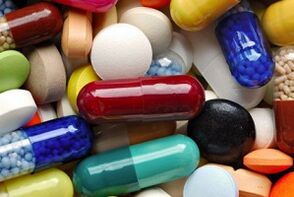Inflammatory processes in the prostate are typical for men in adulthood after 40. Pathologies caused by various hormonal disorders, viruses or bacteria, weak immune defenses, genital and venereal diseases, do not have sex for a long time. Treatment usually does not cause problems, since the pharmaceutical market offers a lot of modern drugs that effectively cope with prostatitis. Only a qualified urologist should decide on the type of prostatitis medication for a particular patient.

Medications used for prostatitis
Medications prescribed to treat prostatitis are available in the form of tablets, suppositories, drops, injections, or microchips. Tablet preparations are usually represented by antibiotics with a fairly wide spectrum of action, which are prescribed in cases where the causative agent of the disease has not been identified. In general, antibiotics are represented by three groups of drugs:
- Fluoroquinolones.
- Penicillin.
- Tetracyclines.
Often in the treatment of prostatitis, suppositories are used that are administered rectally (they are inserted into the anus). Such drugs effectively relieve pain and have an antibacterial effect. The greatest penetration into the tissues of the body is distinguished by injection solutions. They have a systemic effect, stimulating the immune system and the vascular system.
According to experts, the anorectal method to achieve the maximum therapeutic effect should be preferred over other prostatitis treatments.
It is not uncommon for prostatitis treatment to include an injection procedure, when medication is injected directly into the patient's urethral canal. Before using the solution, a man needs to empty his bladder. In one procedure, no more than 5 ml of solution is injected. The main therapy can be supplemented with folk remedies such as microneedling, where the cure for prostatitis is presented in the form of a decoction or herbal infusion. The microindentation technique is based on the complex temperature effect of the drug. Such treatment must be carried out at bedtime, since after microsurgery, hypothermia or overactivity of the prostate gland is unacceptable.
Pharmacological group of drugs for the treatment of prostatitis

Treatment of prostatitis is always complex, which includes the use of drugs of different pharmacological groups: antibiotics, analgesics, α-blockers, muscle relaxants and hormone-containing drugs, antivirals and drugs. anti-inflammatory, as well as phytotherapeutic agents, etc. v. With bacterial prostatitis, antibiotics are the basis of therapy. Treatment with antibiotic tablets is usually prescribed for chronic and acute bacterial prostatitis and lasts about a month. In case of prostatitis with complications, treatment is by injection. If the causative agent of the infection cannot be identified, then combined antibiotic therapy will be instituted.
Anesthetics significantly facilitate the prostatitis process, but they should be taken as directed, since uncontrolled intake of analgesics can cause the appearance of very unpleasant side effects. desire. The use of α-blockers is due to the relaxing effect of these drugs on the bladder neck and muscles, significantly reducing the pain associated with urination. But these drugs cause side effects like low blood pressure or headaches. Similar drugs are prescribed for chronic prostatitis of nonbacterial etiology.
Usually, the body of a man with prostatitis needs to restore and strengthen the immune defenses, which are supported by drugs from the immunomodulatory group, which include interferon and other drugs. .
Used in the treatment of prostatitis and as a muscle relaxant, reducing the tone of the muscles located in the perineum. The use of such drugs is because it is the tension of these muscles that causes discomfort and pain. The use of hormone-containing drugs in the treatment is due to the need to reduce the level of testosterone, stimulating the proliferation of the prostate gland. As a result of hormonal therapy, the intensity of the inflammatory process is reduced, and the hormonal background is normalized. Sometimes, as an additional treatment for prostatitis, herbal preparations are used to eliminate swelling, inflammation and soreness. Herbal remedies are commonly used in the treatment of chronic forms of prostatitis.
In cases of prostatitis of viral etiology, the use of antiviral drugs is indicated. Therapy is often supplemented with non-steroidal anti-inflammatory drugs. The action of these drugs is aimed at eliminating soreness and swelling, high temperature, accompanying inflammatory processes in the prostate gland. Suppositories containing non-steroidal anti-inflammatory agents are especially effective. Drug treatment usually involves the use of drugs that improve blood flow to the prostate gland.
There are many effective drugs for the treatment of prostatitis, but they cannot be prescribed independently, even if there are no contraindications at all.


























